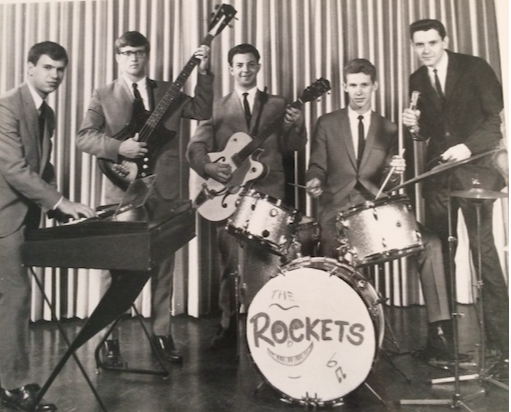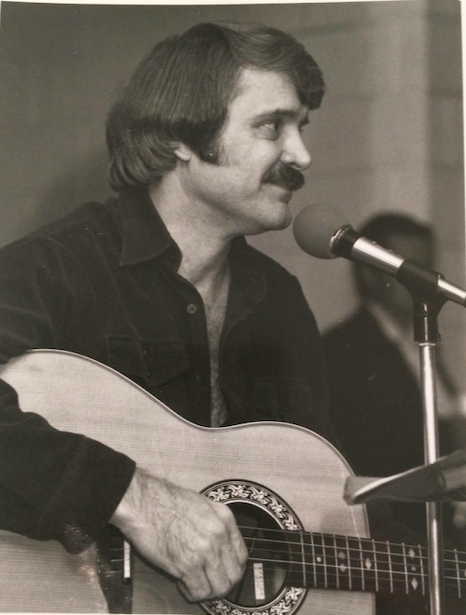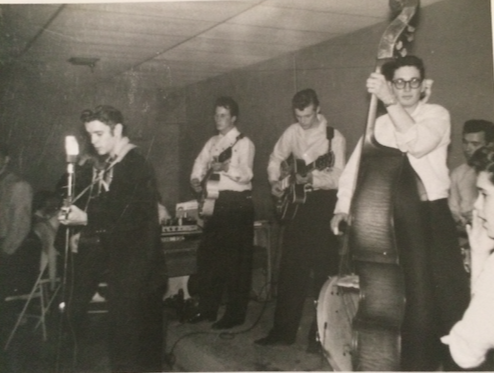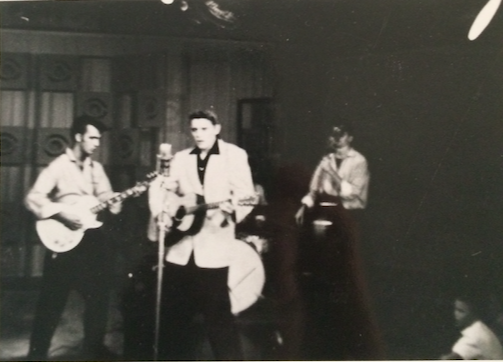Firsts are, to put it mildly, tricky things.
It’s like the old saw about being the fastest gun in the West: There’s always somebody faster. And take it from me, when you’re a historian and/or writer who spends a lot of time doing research on the true origins of such speculative stuff as musical styles and literary movements, you can fall into a variation of that gunslinger axiom; that is, you can declare that someone was the first to do a certain thing, only to find out later there was someone before him or her who was doing the very same thing.
In other words, there’s always – or usually – somebody earlier.
However, when it comes to naming Tulsa’s very first rock ‘n’ roll star, I’ve been convinced for years that there’s little doubt who it was: a singer and guitar player named Gene Crose.
Gene certainly thought so, and so did the early rockers I talked to over the years – most of whom had done time in his bands. If you were a Tulsa musician of a certain age and skill level, your musical road at one time or another ran through Gene Crose. Such now-famous names as Leon Russell, J.J. Cale, David Gates, and Teegarden & Van Winkle were members of Gene’s band, as were many other well-known area players.
The first time I interviewed Gene, in 1986, I asked him if he had any idea how many musicians he’d employed over what was then his three decades in the business.
“There’s been so many,” he said with a laugh, “that I’d have to start a new numerical system.”
In the beginning, of course, it was just Gene himself – and the music inside him.
“I really believe I was born singing,” he told me in a 2003 interview, adding that when he was just a toddler, “I had a little guitar. I couldn’t play it, but I thought I could. I ran around the house singing songs like ‘You Are My Sunshine.’
“There’s a story I was going to tell if I ever got on The Tonight Show,” he added. “Mom said the way she could tell if I’d dirtied my diaper was that I’d start singing this little song called ‘It Makes No Difference Now.’”
Gene was in his teens, and still singing, when he enrolled at Oklahoma Military Academy in Claremore, a predecessor of Rogers State University. Each year, he performed country tunes at the school’s annual talent show, Cadet Capers. Like his fellow OMA cadets, Gene lived in barracks on the campus; that’s where, in early 1956, he first encountered the music of a hillbilly cat named Elvis Presley.
Over the years, Gene told two slightly different versions of that life-changing event – which, in retrospect, probably both happened around the same time. One involved a fellow cadet from Odessa, Texas, who’d happened to see Elvis on tour in ‘55 and had bought one of his early Sun Records discs. The A-side was “Baby, Let’s Play House,” and once Gene heard it, he knew his country-singing days were over.
On the other hand, Gene sometimes said that the Elvis connection happened when he caught Presley’s first nationally televised appearance while watching TV in the cadet lounge. That would’ve been in January of 1956, on The Dorsey Brothers Stage Show, where the up-and-coming rocker sang a medley of “Shake, Rattle, and Roll” and “Flip, Flop, and Fly,” along with the Ray Charles R&B hit “I Got A Woman.”
On that program, Gene remembered, Elvis “acted like an animal just let out of a cage, and that intrigued me. The night I saw him on the Dorsey show, I decided to take the style I was going to do, the country and western, and replace it with this new feeling. It just all kind of fell in place, and it’s astonishing to me now how it did.”
Cadet Capers happened to be coming up about that time, and Gene and his all-cadet band, then called the Wranglers, were scheduled to do a couple of country numbers. Post-Elvis, those went out the window, and the audience of cadets and their families gave Gene and his three Presley tunes a standing ovation.
“I was just going all over the place when I was singing,” he recalled. “I’d never seen Elvis do all his wild stuff, but I just felt it. That’s all there was to it. I couldn’t sing that kind of music and stand still.
“That night,” he added, “I signed so many autographs my fingers were sore. No kidding. I didn’t know what was going on. I just knew I was doing something I enjoyed.”
Gene and his band – which would be redubbed the Rockets – made such a splash that the academy’s president asked them to tour with the cadet orchestra, which played gigs around the area to raise consciousness about OMA. But wild, Elvis-style rockabilly and military-school restraint and discipline made for an uneasy mix. Sometimes, the officer in charge would get so exercised about being upstaged by Gene and the Rockets that he’d pull the plugs on their amplifiers. And once, when they were closing the show and the crowd kept demanding encores, the bandleader ordered the bus and the rest of the musicians to leave without Gene and the boys, who had to commandeer a car to get to their next stop.
And so began the reign of the man many called “Tulsa’s Elvis,” the first of our local rock ‘n’ roll idols. It wasn’t long before he’d hooked up with deejay Chris Lane and begun appearing on Lane’s teen-oriented TV show, Party Lane with Chris. Rock ‘n’ roll was still new then, and so was Presley. Girls would write to Gene at the station, asking him, “Do you sing like Elvis, or does Elvis sing like you?”
Unlike many of those who had come up through his bands, Gene Crose never went West in that rock ‘n’ roll exodus of the late ‘50s and early ‘60s that landed so many great Tulsa performers squarely in the middle of the Southern California pop-music scene. He never signed a real recording contract. But he was nonetheless a huge and lasting influence on our sound and our musicians.
One of those he influenced was his own son, Beau Crose, a drummer and vocalist now living in Utah. During a visit late in his father’s life, Beau remembered, he was complaining to Gene about a small crowd that had recently come out for Beau and his classic-rock band, the Sons of Thunder.
“He said, ‘Son, you’ve said something to me that’s really got me bothered,’” recalls Beau. “‘You told me you really didn’t want to give it your all because there were maybe 30 people there.’
“I said, ‘Yeah. It’s depressing, Dad, when you look out and see a crowd like that.’
“‘It doesn’t matter, son,’ he said. ‘They came to see a performance. Son, I love you, but I’m gonna lay it straight on the line: Whether I performed for one person or a thousand people, I gave it my all, every time. Every time. That’s the way you’ve got to do it, man. If you’re going to be a performer, you’ve got to do it that way. Just like Elvis did.’”
This past August 13, at the age of 84, Gene Crose passed away. Of course, Elvis Presley – his inspiration – had died 43 years earlier, but during the same month, only three days later.
In a tribute to Gene Crose and his musical legacy, Beau and the other members of his Utah-based band voted to change the name of their rock ‘n’ roll group.
It’s now the Rockets.





























